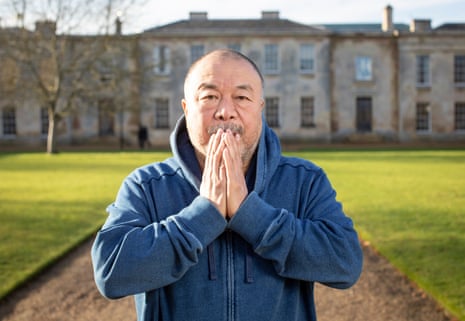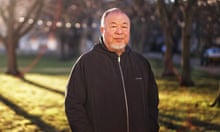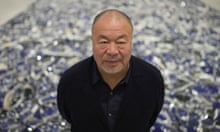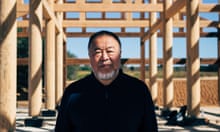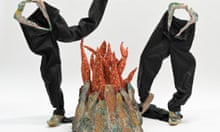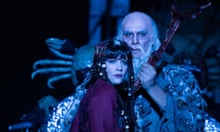‘When we filmed this,” says Ai Weiwei, “the elephants didn’t know what to do. Once they were used for labour, and now they have lost their job.” The artist is talking about the groundbreaking documentary he has just made about unemployed logging elephants in Myanmar. You watch the film, shot with 360-degree virtual reality technology, through a special headset. Turn your head slowly and your view gradually changes. Turn your head 180 degrees and the picture changes completely.
“When they lost their job,” he continues, “each elephant had a few people to take care of it, so those people also lost their job.” Ai (Weiwei is his first name and means unknown or future) relates to the elephants as readily as he does to the subject of the second part of his VR project – this one about the lives of Rohingya refugees in a Bangladeshi camp.
Rather than showing the suffering in the camp, Ai focuses on moments of joy: we see the wonder of children as the food trucks arrive, the generous portions of meat given out to celebrate Eid, the dazzling school built for the kids. “I feel [there are] a lot of positive things about humanity even in the worst conditions,” Ai says. “I don’t want to show there is just sadness.”
The Chinese artist and activist understands loss, displacement and existential danger as well as anybody. And what he wants to talk about today is his personal sense of threat. It’s four months since Ai quit Germany for Britain, and he is adapting quickly to his new home. He orders English breakfast tea and lays into the country that gave him refuge after fleeing China in 2015. Germany is intolerant, bigoted and authoritarian, he says. And he’s barely started.
Does he really believe that post-Brexit Britain will prove a haven of tolerance? He smiles and says he’s here primarily for his son. He believes 10-year-old Lao will get a good education in Britain – and will be safe. “I don’t want him to live in harsh conditions. I don’t think Germany provides a good environment for foreigners.” He mentions that Lao was recently threatened by a shop owner there.
While Ai insists he has no illusions about Britain, he still thinks it will be better for his family. “In Britain they are colonial. They are polite at least. But in Germany, they don’t have this politeness. They would say in Germany you have to speak German. They have been very rude in daily situations. They deeply don’t like foreigners.” If Britain does let him down, he assures me he’ll let us all know.
We meet at an upmarket hotel in Cambridge, the city where the 62-year-old now lives. He is dressed in trademark black, head shaved and beard clipped. There is something mesmerising about him: he has the appearance of a bouncer, the manner of a priest and the language of a revolutionary. With the gentlest of voices, he continues to eviscerate Germany. “I don’t like a state or culture that so obeys authority.” Ai has never been one for obeying authority.
He slurps his tea and smiles. “Germany is a very precise society. Its people love the comfort of being oppressed. In China, too, you see that. Once you’re used to it, it can be very enjoyable. And you can see the efficiency, the show, the sense of their power being extended through the connected-mind condition.” You mean there is no room for individuality? “Yes. They have a different kind of suit: it doesn’t look like what they wore in the 1930s, but it still has the same kind of function. They identify with the cult of that authoritarian mindset.”
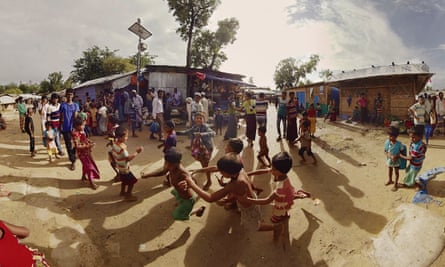
Ai has been left devastated by his time in Germany, where he still has a studio. In 2017, the AFD – the anti-immigrant, rightwing populist party with far-right elements – entered the federal parliament for the first time with 12.6% of the vote, becoming Germany’s biggest opposition party. In 2018, thousands of rightwing extremists took to the streets of Chemnitz, to the east of the country, shouting “Foreigners out” and chasing people they believed were refugees. Ai believes the country has become indifferent to the suffering of others, both within Germany and outside. He says it doesn’t care about what is happening in Hong Kong because keeping in with China’s markets is the priority.
Is he comparing today’s Germany with Nazi Germany? “Fascism is to think one ideology is higher than others and to try to purify that ideology by dismissing other types of thinking. That’s Nazism. And that Nazism perfectly exists in German daily life today.”
Then there is his own experience. He mentions the three times he has been thrown out of taxis. There was no overt racism, he says, but he was pretty sure what lay beneath it all. Tell me, I say. “It’s a long story,” Ai replies, as he often does. “On one occasion, there was a strong perfume. I am sensitive to perfume, so I have to take down the window, and they say, ‘Pull up the window.’ I say, ‘No, the perfume is too strong.’ And they say, ‘Just get out of my taxi.’”
Where was this? “Berlin! Berlin, every time. And another time in a taxi, the driver was listening to music and my phone rings. My mum calls me from China, I have to answer. He says, ‘Shut off your phone.’ I say, ‘This is my mum.’ He says, ‘You have to shut off your phone.’ Then he suddenly braked and me, my son and girlfriend were thrown forward.”
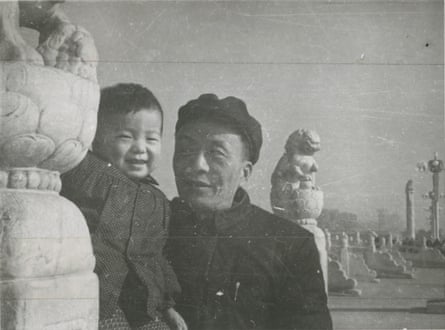
Ai has spent his life fighting for justice. Perhaps it’s in his blood. His father, the poet Ai Qing, was sent to a labour camp in the countryside for criticising Maoist communism. Ai shows me a photo of the family home – a cave in the middle of nowhere. “My family had to live in this black hole for five years.” Ai Qing’s new job was to clean the ditch that served as the village toilet. How did he cope with his change in circumstances? “He was a man with a big heart, and had great acceptance.”
Following Mao’s death in 1976 and after 19 years of manual labour, Ai Qing and the family returned to Beijing. His work was “unbanned” and he regained his prominence. “He is still considered the number one national poet,” Ai says proudly. “They call him the people’s poet. He was a really passionate, romantic fighter. A soldier. He always talked about justice, beauty and integrity. He believed in a perfect world. I believe life is a struggle for it.”
Ai enrolled in the Beijing Film Academy and studied animation – one of many courses he failed to complete. He then became one of the first of his generation allowed to study in the US. He was told by his tutor that his drawings lacked heart. He never drew again. (Ai shows me a drawing of a forest he did as a student, which his father used to illustrate a book of poems. It is exceptionally beautiful). He did all sort of jobs to support himself: collecting rubbish, factory work, carpentry, babysitting and barbering.
He befriended beat poet Allen Ginsberg, went to the same parties as Andy Warhol, whose work he adored, discovered Marcel Duchamp and dadaism, and began transforming readymade objects into art (including Hanging Man, a homage to Duchamp made from a wire coat hanger).
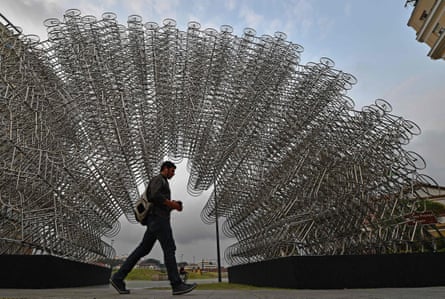
Ai returned to Beijing in 1993. Since then there is little he hasn’t done in the name of art, protest and fun – often in the same work. So we have the 100m hand-painted porcelain sunflower seeds that filled the floor of the Turbine Hall in London’s Tate Modern; the gorgeous Forever Bicycles sculpture composed of 1,254 stainless steel bikes; and Dropping a Han Dynasty Urn, in which he smashes a 2,000-year-old vase. His art delivers social critique as visual puns. With the sunflower seeds he suggests we are all different despite appearances; with the vase he destroys history just as Mao did; and with the bikes he comments on cultural uniformity.
Some work is more solemn: a list of names of the 5,219 schoolchildren who died in the 2008 Sichuan earthquake (obtained from a year’s research); the documentary Human Flow, in which he visits refugee camps around the world and reflects on man’s inhumanity to man. Other work has transformed the landscape – Ai co-designed the Bird’s Nest, as the 2008 Olympic stadium in Beijing became known, though he has since said he regretted creating such a monument for the state and has never stepped foot inside the finished building. And some work, if it is work at all, is just plain bonkers, such as the joyous video of Ai and his friends dancing Gangnam Style.
With the Bird’s Nest, he became famous as a dissident artist and seemed untouchable, protected by his popularity. Then in 2010, he claimed to have been beaten by police while trying to report a previous incident, in which he was punched in the head by a policeman, leading to him suffering a brain haemorrhage. “I was hours away from dying,” he says. That same year, the authorities tore down his government-funded studio. Rather than protesting, he turned the event into a piece of performance art, holding a crab feast to celebrate the act of destruction. (This was another classic Ai pun. He xie, the word for crab, sounds just like “harmonious” in Mandarin – a word used by the government to describe society, and reclaimed by critics to mean censorship.)

In 2011, Ai was jailed and told he faced 13 years in prison for subversion of state power, but was released after 81 days and given a $2.4m (£1.5m) fine for tax evasion. The money was raised by supporters worldwide. Ai’s passport was confiscated and he was placed under house arrest for four years. When his passport was returned, he left for Germany, where he had been offered a professorship at Berlin University of the Arts.
I ask if he thinks he would have been an artist if he hadn’t grown up in China. “No,” he says. “No, I would not be an artist because an artist is not something I would have rated as important. My interrogator in the secret police once asked me, ‘Weiwei, if we don’t give you so much pressure, you would never be so famous, right?’ And I said, ‘Yes, you are right. It takes an enemy to make me a soldier. If I don’t have a great monster to fight, who am I?’”
Ai is clear about the purpose of his art: it is not primarily aesthetic or cerebral, it is political. “If my art has any meaning, it is as a tool for freedom. If I see people victimised by authoritarianism, I am a soldier in defending their freedom. I can be as brutal as any animal to protect the essential value I love.”

As I’m talking, I notice him taking a picture with his phone. Was he taking a photo of me? He laughs. “No, the camera is taking the photo.” He has been doing this for years wherever he goes. Ai really is gloriously eccentric. Whether his selfies are in the name of art, entertainment or bearing witness, it’s hard to know. I’m not sure he even knows.
Ai has spent a great deal of the last five years filming displaced people (and now animals) in the world’s troubled spots. And he’s exhausted. He thinks his days as an artist may be coming to an end. For 15 years, he adds, the world has treated his work with respect, and that is never good for creativity. “I almost don’t think of myself as artist now,” he says. “My curiosity is getting less and less. The art culture institutions say, ‘Oh, Weiwei have a show next year with us.’ I’m suddenly very privileged, but now I’m getting tired.”
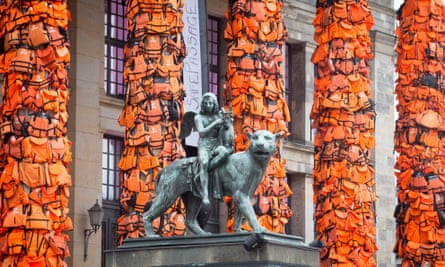
Privilege does not sit easily with him. You sense part of him would like to return to his days in the cave with the family, or struggling on $3 a day in the US. Will he retire? He looks at me in disbelief. “I cannot say I’ll retire, but maybe I’ll disappear.” Where to? “Maybe I’ll disappear in Cambridge!” Will he go back to China? “I want to. My mum’s old and I want to see her. I’ve not seen her for a few years.” But he worries that he may be arrested or have his passport confiscated.
So what would he do if he stopped making art? He smiles mischievously, slurps his cold tea and takes out his phone again. He shows me four short films of young people with trendy haircuts. Their hair is entirely shaved on one side, then they flick their heads and magically they have a full head of hair. “When I was young I used to cut all my classmates’ hair. Three days ago, I cut the hair of these four students.” He looks so chuffed with these “optical illusion” haircuts. “I did four in 20 minutes. I am a proper professional! I may open a barbershop in London.”
He seems to be getting more into the idea by the second. “I think it is more fun to be a barber than an artist,” he says. Couldn’t he mix art with barbering? He shakes his head vehemently. No, he says, definitely not. “You would never mix such a holy profession with art.”
A trailer of Omni will be shown at a Guardian event with Ai Weiwei on 30 January at Cadogan Hall, London.
Viewers on mobile should already have the YouTube app pre-installed. You must click on the title in the embedded video, and will then be taken to the video in-app where you can actually experience the video in 360.
